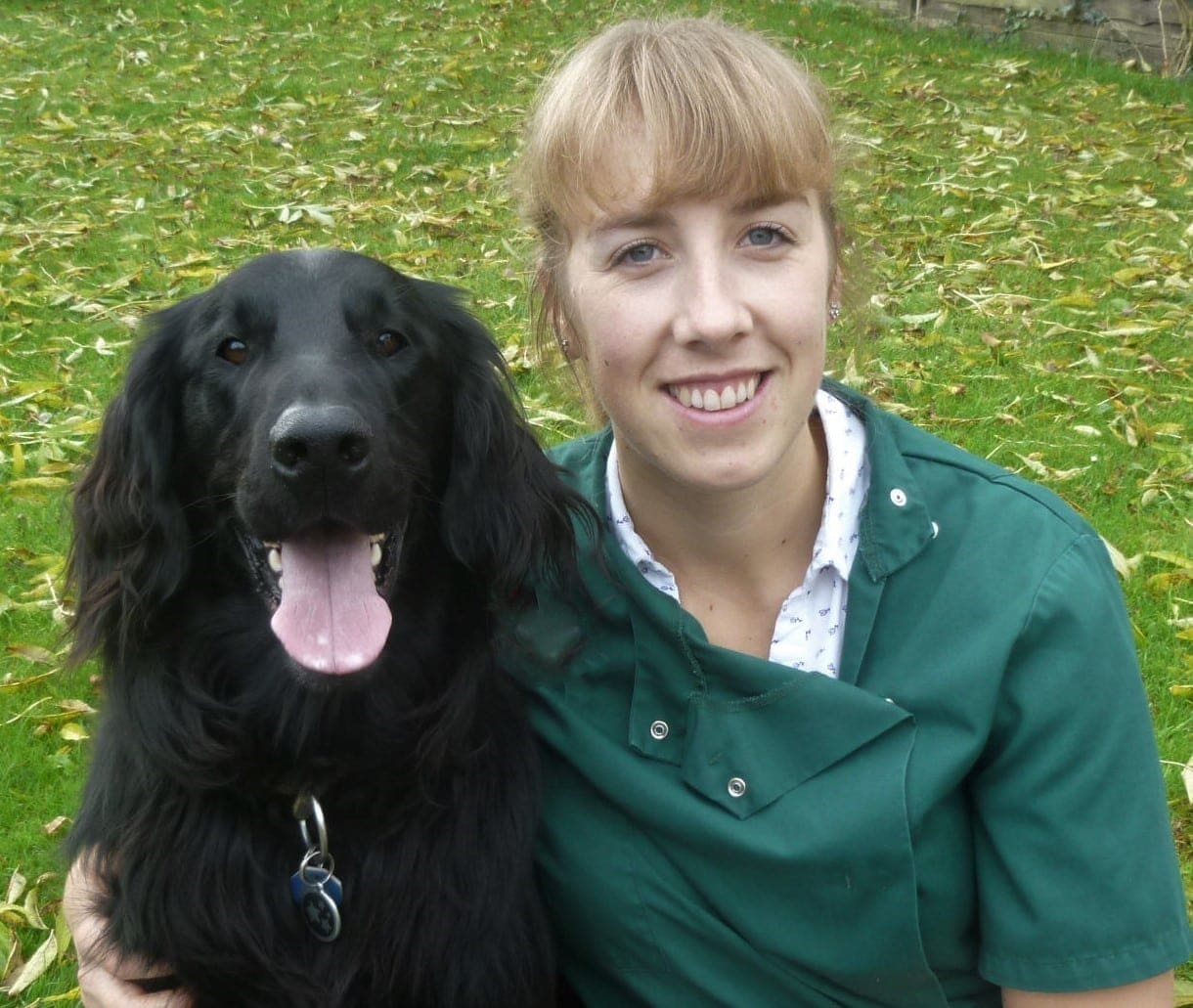14 Simple Steps to Stop Your Dog from Snoring (Expert Tips!)

Updated on
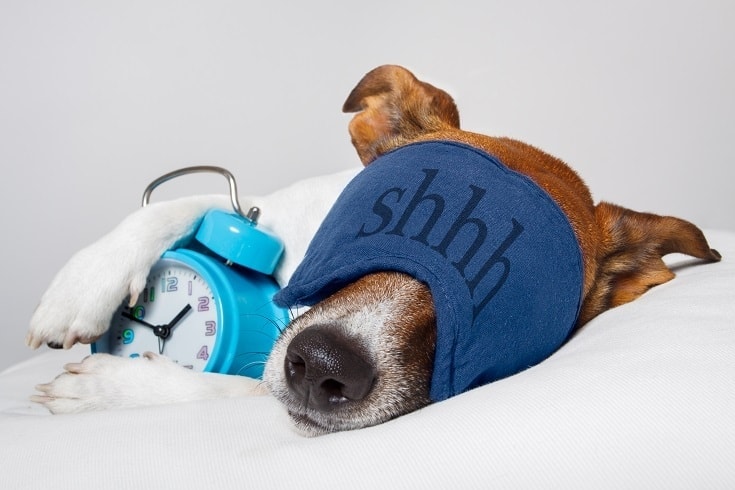
Having a dog that snores constantly can be a huge problem, especially if it sleeps in the same room or shares the bed with you, which they usually do. Snoring can also be a symptom of an underlying health problem, so it isn’t something you should ignore even if you could.
We’ve put together a complete list of remedies you can try to help you have a peaceful sleep and improve the sleep quality of your pet. Join us while we go over the obvious and the not-so-obvious snoring remedies that you can try immediately to help you get a better night’s rest. Here are the 14 simple steps you can take to reduce or eliminate your pet’s snoring.
The 14 Steps to Stop Your Dog from Snoring
1. Predisposition
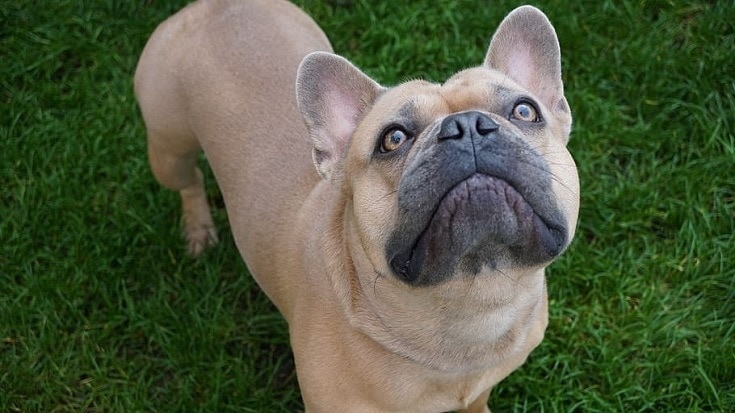
The first step to eliminating snoring is to realize that certain dog breeds are prone to snoring. Brachycephalic or short-headed breeds are the most susceptible to the snoring condition. Brachycephalic breeds include Bulldogs, Boxers, Pugs, Sih-Tzus Himalayans, and many more. The scrunched-in snouts on these dogs significantly reduce the room in their nasal cavities, which can make it hard for them to breathe and cause them to snore. If you are a light sleeper and uninterrupted sleep is critical to your lifestyle, you may need to avoid purchasing one of these breeds.
2. Change Their Sleeping Position
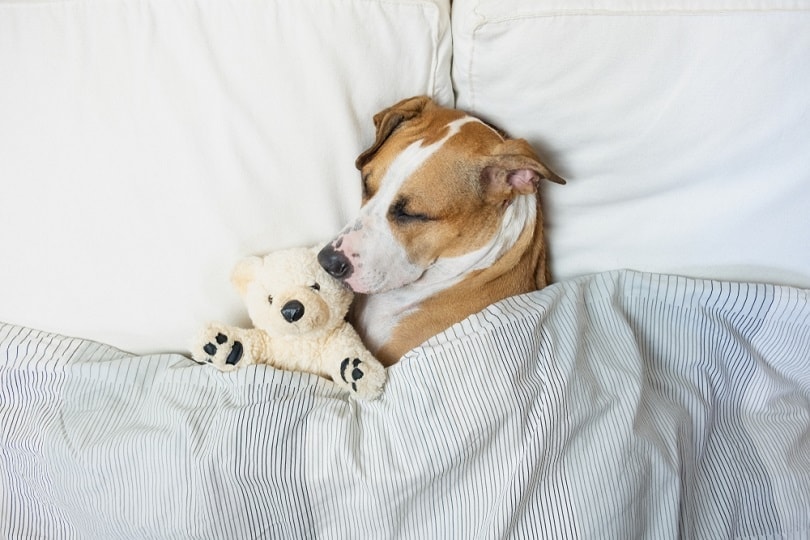
Sometimes a little nudge to get them to roll over or change their sleeping position is enough to make the snoring stop. Even a non-snoring pup can occasionally find a sleeping position that causes snoring.
3. Use a Pillow

If your pet likes to sleep in the same position and a gentle nudging doesn’t help make the snoring stop, it can often be helpful to use a pillow. Using a pillow to prop up your pet’s head can often reduce snoring by opening the airways up enough for your pet to breathe freely.
4. Use a Round Bed

If your dog tends to sleep in the same position every night and it leads to snoring, you can try using a round bed. Round beds have a way of naturally changing your pet’s sleeping position, causing the dog to sleep more curled up than straight, which often leads to less snoring.
5. Clean the Bedding

Now we start to get into some things that not everyone considers. Over time, your pet’s bed can collect dander, dirt, dust mites, oils, pollen, nicotine, and many other contaminants. Any of these contaminants can cause a mild allergic reaction in your pet that causes your pet’s nasal cavities to fill up with mucous, reducing airflow and causing snoring. Many times, washing and changing the bedding can reduce or eliminate the snoring.
6. Use an Air Purifier
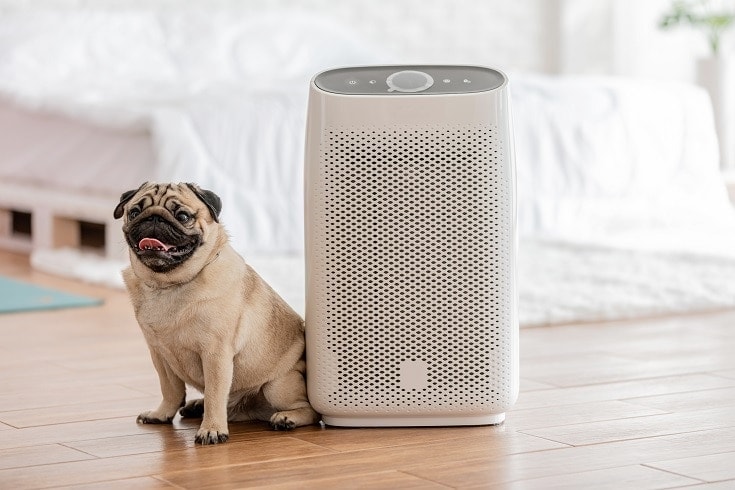
The air can contain a lot of contaminants, just like your pet’s bedding. You can often find pollen, pollution from automobiles, cigarette smoke, and many other contaminants in the air we all breathe. These contaminants can start an allergic reaction that causes a stuffy nose, which restricts airflow and causes snoring. To combat these contaminants, you can try using a personal air filter that can help reduce the number of harmful particles in the air. Fewer pollutants mean less chance of an allergic reaction.
7. Use a Humidifier

Dry air can dry out the sinuses, causing them to crack. When this happens, swelling can occur around the affected area, causing soreness and making it difficult to breathe, resulting in snoring while your pet sleeps. Dry sinuses are very common during the winter months when radiators and other heat sources remove all of the water vapor from the air. If you think dry air is the source of the problem for your pet, you can try purchasing a humidifier to replenish the moisture in the air. Humidifiers are inexpensive and readily available at most large shopping centers or online.
8. Diet and Exercise

Obesity can be another cause of snoring in your pet. As your dog gains weight, the fat molecules can build up in the neck and face putting pressure on the air passageways. When these passageways get closed off too much, it can make it difficult to breathe, leading to snoring. Keeping your pet’s weight ideal for its size can dramatically reduce snoring and extend the life of your pet.
9. Look for Signs of Infection

We’ve mentioned that dry sinuses can lead to an infection that restricts airflow, but other infections do the same as well. Any infection in the area of the face or neck has the potential to pinch off airways resulting in snoring. If you notice any swelling or soreness, you should take your pet to the vet immediately.
10. Dental Care
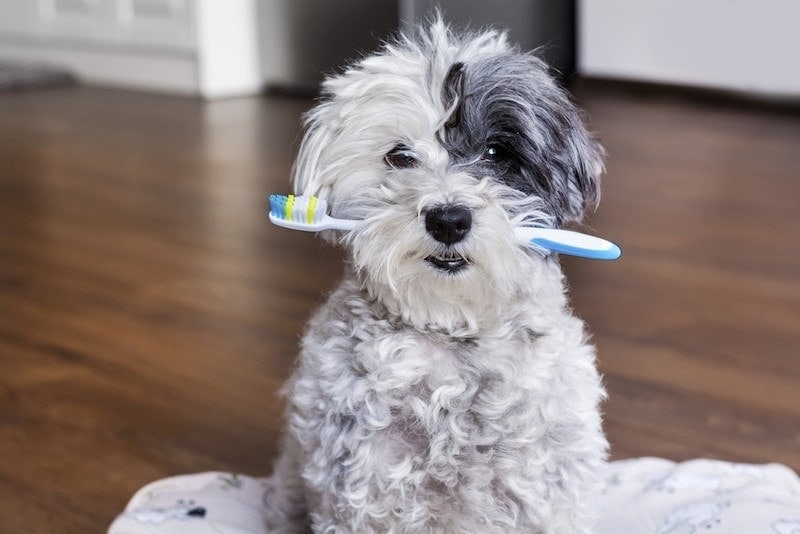
One of the biggest reasons behind swelling and infections in the face area is dental decay. Cavities, a broken or chipped tooth, and many other dental conditions can lead to swelling in the area of the air passageways. To make matters worse, it’s not always easy to determine if your pet has a dental problem without visiting the vet, so you will need to watch for swelling and an aversion to eating to identify a dental issue quickly.
Manually brushing your pet’s teeth and a diet of dry kibble is the best way to prevent dental problems. When manually brushing your pet’s teeth, it’s important to use a doggy toothpaste, as many kinds of human toothpaste have an artificial sweetener called Xylitol that can be deadly to dogs, even in small amounts.
11. Blockage

Another cause of restricted airways can be a blockage, which can be a tumor that is pressing it closed or a foreign object that is stuck. In either case, the only thing you can do is to take your pet to the vet where it can receive proper treatment.
12. Medication
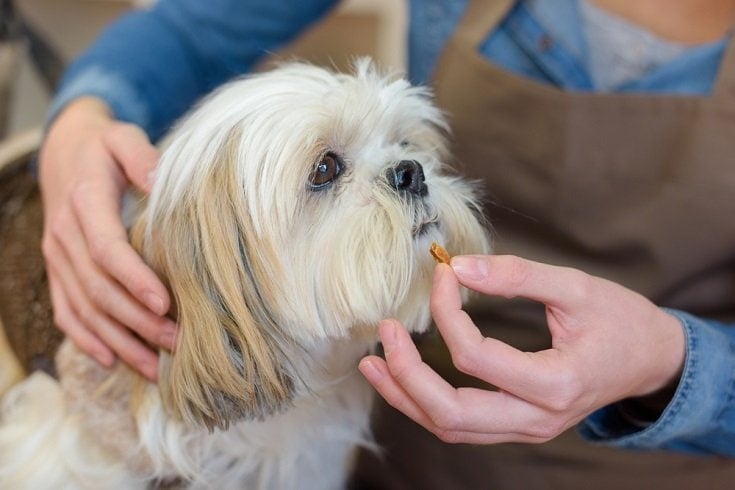
Since we have been talking about several medical conditions that can cause your pet to snore, we should also mention that any medication they are taking to deal with a health problem can also cause your pet to snore. Some medicines, like pain relievers and sedatives, can put your pet into a deep sleep that induces snoring. If your pet has recently begun to take medication that is causing them to snore, you might try calling your vet to see if there is an alternative to the brand they are taking.
13. Surgery
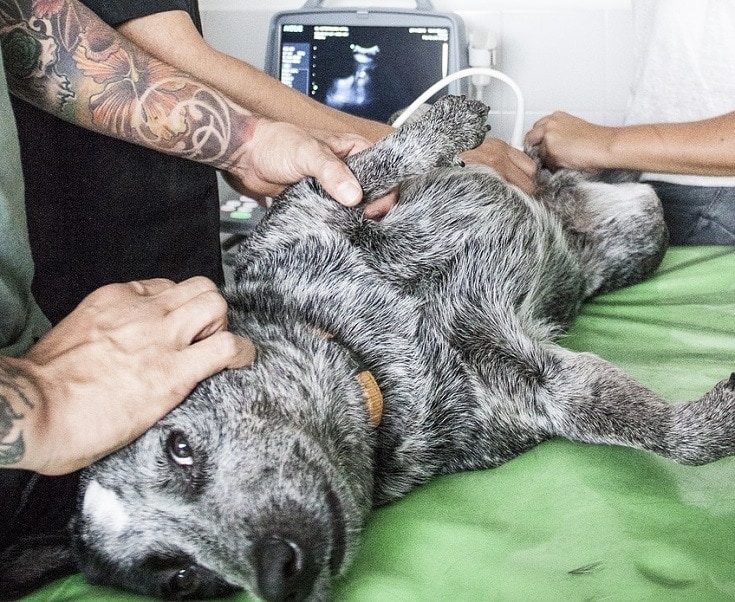
Unfortunately, surgery is sometimes the only way to reduce snoring. Surgery can help open airways for dogs with scrunched-in faces. It can also remove tumors, bad teeth, and foreign objects that can restrict airflow and cause snoring. However, surgery is expensive and not something we want to put our pet through, so you will need to discuss with your vet what the best course of action is considering the circumstances.
14. SnoreStop
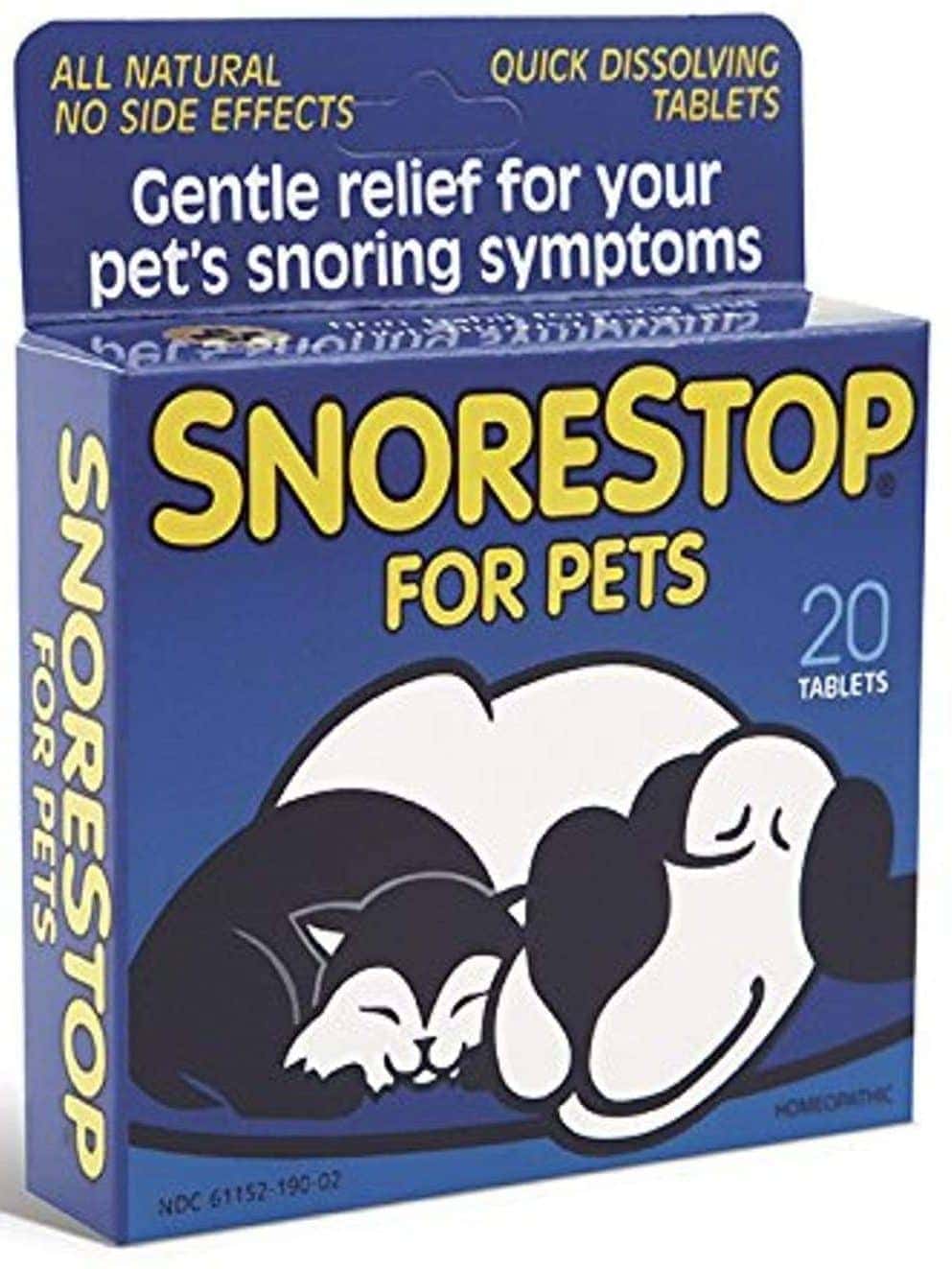
Finally, if nothing else works or surgery is not an option you are willing to pursue, you can try the commercial product SnoreStop. SnoreStop is available for humans as well as pets, and it uses only all-natural ingredients. It’s been available since 1995, so there is some evidence that it works. The only problem with this product is that it is not effective on all dogs, and it may only reduce snoring a little.
Final Thoughts
There are several ways to eliminate or reduce your pet’s snoring, and we recommend starting easy with the first couple of steps. The round bed works well because once your pet uses it, no further action is required. Otherwise, you would need to tap them to change positions or put a pillow under their head every time they snore, which can be inconvenient. Air purifiers work well, especially during pollen season, or if a member of the household smokes. Humidifiers can work well in the winter, and SnoreStop is a great product to try when nothing else seems to work.
Hopefully, your pet doesn’t have any of the more serious health problems that require a vet’s attention, but if you keep them at a healthy weight and keep their teeth clean, you’ve done the best you could.
If you have enjoyed reading and picked up some new tips, please share these 14 simple steps to stop your dog from snoring on Facebook and Twitter.
Featured Image Credit: Javier Brosch, Shutterstock





